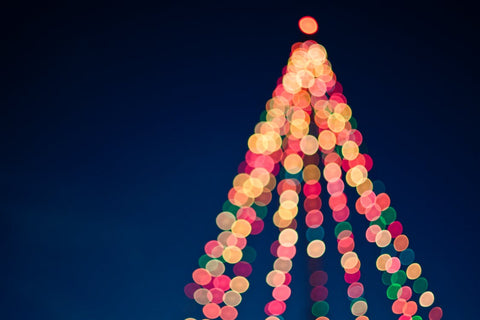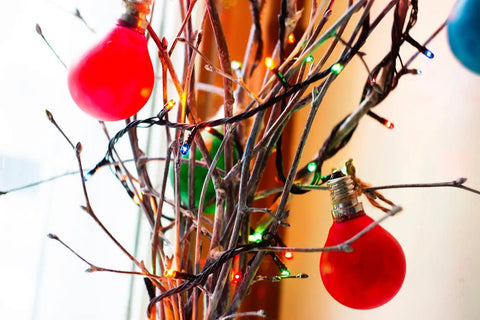The Strange & Unique History of Christmas Lights
Hanging Christmas lights inside and outside of your home is a wonderful way to get into the holiday spirit. While you probably already know that Thomas Edison played a major role in the invention of the Christmas lights, the history behind this fun and decorative invention is quite intriguing. That’s why, in this blog, we’ll look at the strange and unique history of Christmas lights and how they came to be such a popular Christmas decoration.
At The Christmas Light Emporium, we’re proud to be a leading provider of LED Christmas Lights and holiday decorations. From traditional C7 LED Christmas Lights to Incandescent Lights and Snowfall Lights, we offer a wide variety of lights to help you spruce up your home for the holidays. Shop our online store today!
 Edison’s Christmas Light Show
Edison’s Christmas Light Show
Once 1880 rolled around, Thomas Edison already had incandescent light bulbs pretty well figured out, he was just looking for a unique way to advertise them. In an attempt to display his impressive invention, Edison took it upon himself to display his holiday lights outside of his Menlo Park laboratory compound so that passing commuters on the railway could see them as they passed by. Two years later, a man named Edward Johnson (who studied under Edison), displayed the first electrically illuminated Christmas tree at his home in Manhattan. This 80-light display featured red, white, and blue lights wrapped around a Charlie Brown-looking Christmas tree for guests and visitors to admire.
Today, we look at Christmas lights and think, “Wow, those are pretty,” but the original tradition of lighting trees in the winter months didn’t necessarily start out with aesthetics in mind. Back in the day, the only way to add Christmas lights to a tree was through the use of candles. Obviously, this decorating strategy posed some serious fire risks, which is why people would sit around the tree and watch it vigilantly to ensure their homes didn’t catch on fire. By 1908, insurance companies started to refuse to pay for damages that were caused by Christmas tree fires because there were so many of them. It was decided that burning wax candles that were loosely secured to a dried-out Christmas tree wasn’t a safe and responsible move for homeowners.
At this time, people began to use incandescent bulbs around their Christmas tree for their illumination needs. These lights were far from perfect though, since incandescent light bulbs can get plenty hot, and the sparks from malfunctioning strings can still light up a tree in a matter of seconds.
The Dawn Of Christmas Lights
By 1900, approximately eight years after General Electric purchased the patent rights to Edison’s light bulbs, the first known advertisement for Christmas tree lights appeared in the Scientific American Magazine. At the time, these decorative lights were fairly expensive, which is why the ad even suggested that people rent the lights for their holiday displays. Within 25 years, the demand for Christmas lights was on the rise, with 15 separate companies selling their own version of Christmas lights. In 1925, these companies formed a consortium that would be known as NOMA Electric Corporation, the largest Christmas light manufacturer in the world.
Even though NOMA was formed three years prior to the Great Depression, their enormous appeal was enough for them to pull through. In an attempt to further Edison’s vision for Christmas lights, they worked very hard to become the world’s biggest manufacturer of the bubble light. These lights featured a liquid, usually methylene chloride (a chemical with a very low boiling point), that would bubble and flicker just like the traditional candle that it was meant to replace.
Popular Christmas Lights You Know And Love
If you’re like most people, Christmas lights are probably a very important aspect of the holiday season for you and your family. Nothing says Christmas like a brightly-lit pine tree or festive lights hanging delicately around your home. Let’s look at some popular Christmas light choices below!

Incandescent Lights
These are the light bulbs that started it all. Even though they are well over a hundred years old now, the technology of these lights remains practically the same. The shapes and sizes of these light bulbs, however, has been in a constant flux since their invention. At The Christmas Light Emporium, we’re proud to carry a large selection of Incandescent Christmas Lights on our website. Browse our online store today to find the perfect incandescent lights for your Christmas tree or home!
C7 and C9 Lights
C7 and C9 Christmas Lights are among the most popular holiday lighting options today. The numbers in their name refer to their sizes, making C7 lights two-inches long and C9 lights three-inches long. Both styles can either come in white or colored bases, and the bulbs screw individually into the sockets. These lights are mostly known for their brightness and long-lasting nature. Browse our selection of C7 and C9 LED Christmas lights today!
Mini Lights
The Christmas mini lights are among the most traditional lights to hang for the Christmas holiday. This bulb style is very attractive and tends to work well with LED lights. Perfect for hanging around your tree, wrapping around railings, or displaying outside your front stoop, you’ll love the vibrancy these lights have to offer.
5MM LED Lights
While these lights are very small in size, 5MM LED Christmas Lights are known to produce bright and consistent light output. Recommended for both indoor and outdoor Christmas displays, these lights are great for hanging on the Christmas tree.
Net Lights
If you’re looking for an easy way to decorate the bushes or shrubs outside of your home, consider investing in some Net Lights this holiday season. As their name indicates, net lights are standard Christmas lights that are configured in a net-like pattern so they can easily be draped over large objects.
If you’re looking for holiday lights and Christmas decorations, be sure to visit The Christmas Light Emporium online store today! From LED Christmas lights to icicle lights, we’re confident you’ll find everything you need to light up your home!




